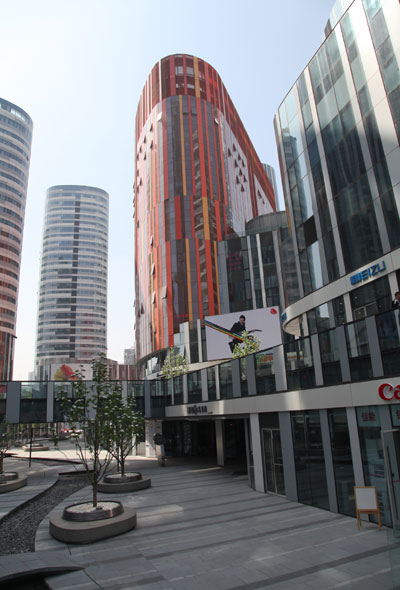
Chen Hong, a 38-year-old entrepreneur from Zhejiang province, has spent 10 days in Beijing, investigating a dozen commercial property projects.
|
 |
|
Commercial property in the Sanlitun area in Beijing. [Photo/China Daily] |
"Retail outlets and offices became my potential investment targets after the government launched its home purchase restriction policy," said Chen, who runs a small trading company in Ningbo.
"I don't expect extraordinary returns from these investments, but they could at least bring me a steady cash flow," he added.
Chen is just one of millions of individual investors struggling to find new opportunities, after the home purchase restrictions were put in place.
And according to a think tank under the Ministry of Housing and Urban-Rural Development, many of the country's private real estate investors have shifted their focus onto the commercial sector.
"Private investors still show strong interest in the property sector, but with investment channels remaining limited, many have to look at commercial opportunities instead," said Qin Hong, director of the Policy Research Center affiliated with the ministry.
Meanwhile, they have also changed the purpose of their investment, shifting from seeking profits by buying and selling residential apartments in the short term, to holding retail properties and offices in the long run, to earn from steady rental income, Qin said.
Li Na, a sales manager for Linglongjie, a retail project along Beijing's eastern Fourth Ring Road, is selling 22 shop units, and said there has been considerable interest from more than 100 potential buyers.
"Many are professional people, individual investors, planning to buy because they were prevented from buying more residential apartments," said Li.
But commercial properties aren't just the current darlings of individual property investors.
Large-scale property developers, too, are targeting the sector, as the market correction has led to better value.
Li Guibin, chairman of Guangyao Dongfang Group, a Beijing-based property developer, said it is actively eyeing commercial property investment opportunities in the first and second-tier cities in northern China.
"Now is also a good time to be considering mergers and acquisitions, as some property developers have suffered a squeeze on cash flow in this latest housing market correction."
According to Li, Guangyao planned to take on four commercial property projects this year, with Beijing being the prime target. The company has a presence in Beijing, Tianjin, Shandong, Shanxi and Hebei.
"Keeping a solid balance sheet and a smooth cash-flow is always the basis of any merger and acquisition," Li added.
CapitaMalls Asia (China), the China operation of CapitaMalls Asia Limited (CapitaMalls Asia), is another company actively seeking M&A opportunities.
In July, CapitaMalls Asia Ltd raised $1 billion to invest in retail real estate in China.
"So far this year, we've acquired three commercial property projects from other property developers, and we hope we can achieve more deals by the end of the year," said Lock Waihan, its China CEO.
Lock said that although China's GDP growth is slower than in previous years, it is still one of the highest rates in the world, and will remain one of the group's three key markets.
He remains confident in the country's retail investment market, and said the company's China malls business registered net income growth of 18.3 percent in the first half year, helped by tenants in second- and third-tier cities, whose numbers grew 15.9 percent during the period.
The company opened five malls across the country in September alone, a record monthly high.
It now has a diversified portfolio of 59 shopping malls across 36 cities in China, with a total gross floor area of approximately 6.01 million square meters.
 Toyota not to close China factories
Toyota not to close China factories Audi: Local models, not price cuts, hold the key
Audi: Local models, not price cuts, hold the key Overseas energy projects get green light
Overseas energy projects get green light Use of RMB as settlement currency rise
Use of RMB as settlement currency rise